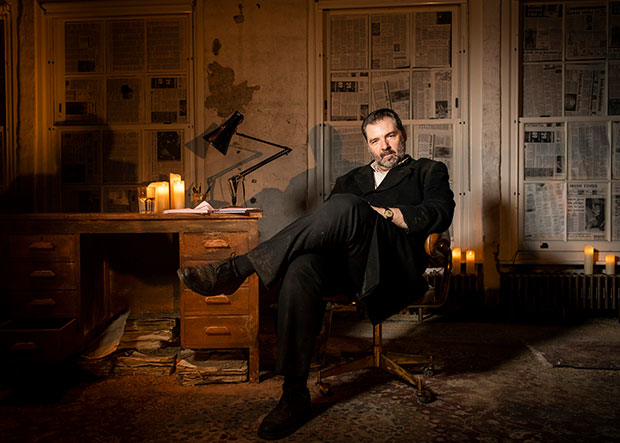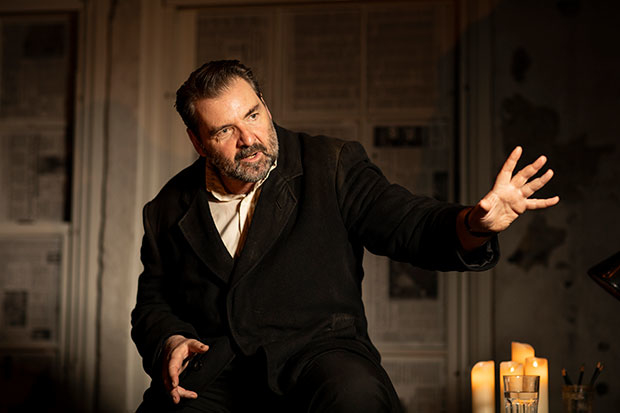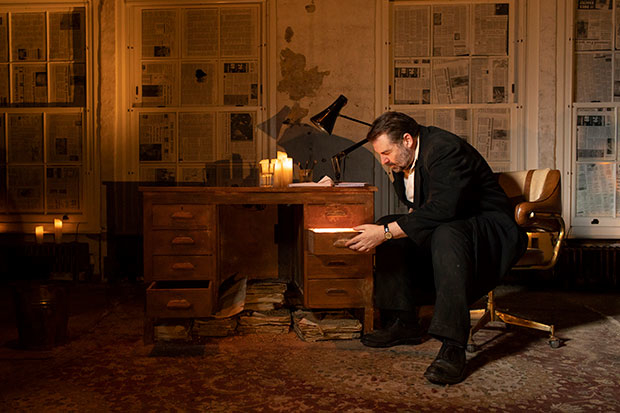Downton Abbey's Mr. Bates Channels His Inner Theater Critic in St. Nicholas
Brendan Coyle doesn't get recognized as much anymore, not since Downton Abbey, on which he played the valet Mr. Bates, ended its run in 2015. But Downton is ever-present in Coyle's mind; he recently finished working on the upcoming film adaptation, set to hit cinemas on September 20, and the success of the show as a whole is probably why he's able to finally tackle a project two decades in the making.
That project, St. Nicholas, is a 1997 Conor McPherson solo drama about a jaded theater critic who begins reflecting on his life after falling in love with an actress, following her to London, and becoming involved with a crowd of vampires. Coyle saw Brian Cox do the play at the Bush Theatre in the late '90s during its only major production, and it has stayed with him ever since.
Coyle premiered his take on the role at the Donmar Warehouse's 60-seat studio last fall. Now, he's brought the show to Chicago for a monthlong run at the Goodman Theatre. It's a perfect storm of events, and Coyle is very happy indeed.

(© Helen Maybanks)
St. Nicholas isn't one of Conor McPherson's best-known plays. How did you discover it, and how did this production come together?
About three years ago, I decided I was going to commit myself to learning it. It's very rarely done, I think, because it's a bit of a beast. I went down to see it at the Bush Theatre around the same time I was doing the McPherson play The Weir, and I was so taken with it. I just thought it was absolutely extraordinary and was afraid it was going to fade into obscurity. I was determined to get it out there, so I vowed to do it one day.
Josie Rourke at the Donmar took up the rights, they appointed Simon Evans as the brilliant director, and it all came together about a year ago in a perfect storm. We premiered it at Conor's request at the Dublin Theater Festival, we did a small black box studio presentation at the Donmar, and I specifically wanted to come to Chicago because I've always wanted to play here. It's been a real adventure.
What is it about Conor's writing that you connect to?
His vision. His breadth of understanding about human nature. The way he can write about a jaded middle-aged critic or a woman who's grieving a lost child. It opens up something inside me, and I connect in a way that I can't really understand. He has this ability to cast this spell — he brings you in and you don't quite know where you're going with it, but it's never obtuse. St. Nicholas can be a little bit untraditional, but it's never confusing.

(© Helen Maybanks)
With that in mind, how do you describe St. Nicholas, in your own words?
It's ostensibly about a theater critic who wields an awful lot of power in the way that critics did pre-social media, and may still do. He's prominent and he is feared in the Dublin community, and he's also a frustrated writer.
For me, the play is about the human condition, seen through the prism of a dissolute man, full of self-loathing for his life, his family, his work, the people he reviews. In the middle of this madness, he falls in love with an actress playing Salome and follows her to London, where he meets these modern-day vampires. The play then becomes quite metaphorical in the second act, where he begins reflecting on his life, and ultimately invites the audience to reflect on life and love.
Did you do any research to prepare? Did you talk to any theater critics in advance?
I didn't. But I had lunch with Chris Jones of the Chicago Tribune the other day, and I couldn't help questioning him on how you write a review, and do you become jaded with more and more theatergoing? Do you start to see where all the cracks are, and therefore, are you inured to not being open to experiencing emotion? I'm fascinated by all that. Would you say that's the case with you?
To some degree. Sometimes, you see a lot of not great stuff in a row, but then there's one show that really enlivens you.
Do you always go there with hope that that's going to happen?
I do. It's counterintuitive to go in thinking that something is going to be terrible.
Yeah. What's joyous about playing this man, he's brutal and he's vicious, but he's in touch with his own vileness. To play someone that honest throws down a gauntlet to the audience. People find that quite appealing.

(© Helen Maybanks)
You said you've always wanted to do a play in Chicago. Is it living up to your expectations?
It really is. It was always an aim to come here. I love Chicago lot. When I was at drama school, Steppenwolf would semi-regularly come to London and that was always a big deal. I remember seeing Mamet for the first time and that was a big revelation. We also watched The Blues Brothers obsessively. [laughs]
Was filming the Downton Abbey movie just like old times?
It was comfortable. We had Michael Engler, who directed quite a lot of episodes, so we were on very solid ground there. It was the same set and locations. The script was more of the same, but on a grander scale. We carry on pretty much from where we left off. There's a lot of pomp and circumstance. A lot of balls and frocks. I'm sure the fans will love it.
Have you gotten any "Hey, Mr. Bates!" yet since you've been in Chicago?
That's kind of abated, if you like. I'm just really grateful that it happened. It's great to be in a hit, and that was a great gig, no doubt about it.










